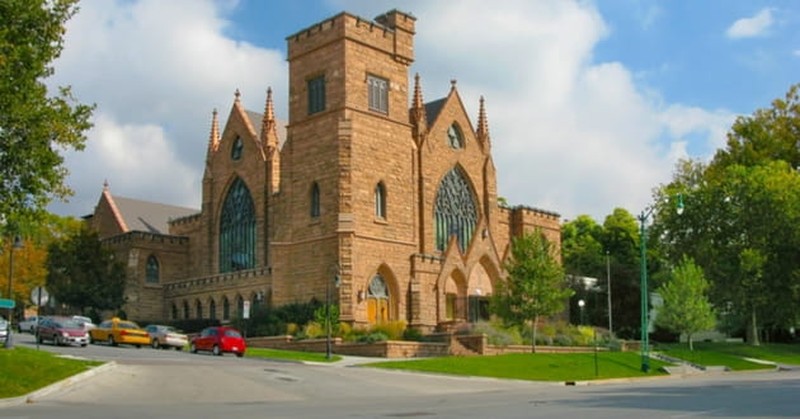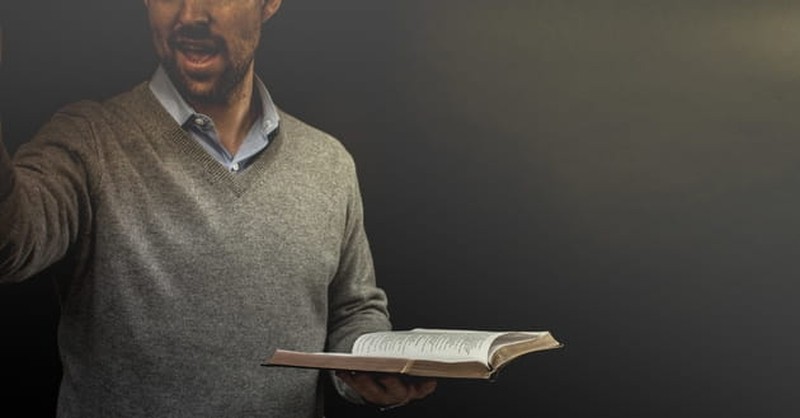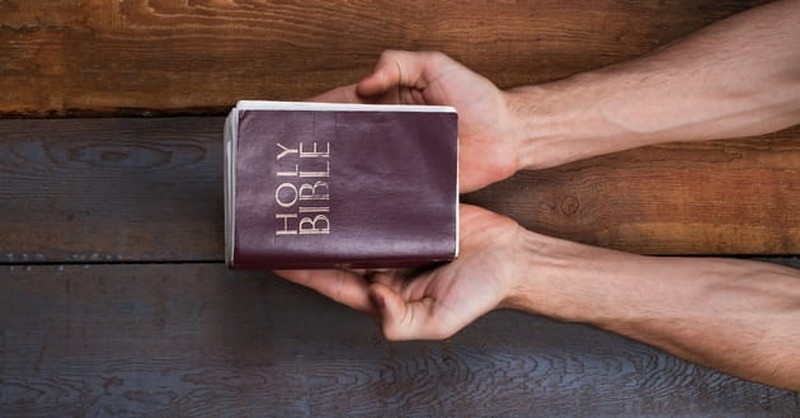Presbyterianism is one of the earliest Christian denominations to come from the Protestant Reformation and has long prided itself on tradition and deep faith.
The church’s unique hierarchy helped America in its early development as a democracy, and its belief in voting and elections is a hallmark of the church.
Here are ten things to know about the Presbyterian church:
Photo credit: ©Playbackmedia.com/SparrowStock

1. Early Presbyterians founded congregations in America as early as the 1630s.
Church roots are traced to Scotland and the writings of John Calvin, but in America, Presbyterians were the earliest Reformed immigrants. They settled along the East Coast and founded congregations in the early 1630s. By 1706, seven Presbyterian ministers formed the first Presbyterian presbytery in America. Then in 1717, a synod was organized of four other presbyteries.
Many early Presbyterians were among those who would help in the writing of the state and national constitutions, according to the Presbyterian Historical Society. The synod itself met in Philadelphia in 1788 to form the General Assembly of the Presbyterian Church in the United States of America and it also adopted its own constitution for the church.
Photo courtesy: Wikipedia

2. There are several denominations of Presbyterianism.
During the First Great Awakening, Presbyterians split over the issue of revivals.One side, called the revivalist New Side, believed in revivalism. The other, called the anti-revivalist Old Side, were considered anti-revivalist. Later, however, the two groups reunited to form a synod.
Another split came in 1810 when the church required ordained ministers to be formally educated. A group of Kentucky ministers decided to withdraw from the formed PCUSA and formed its own synod. Later, like the earlier split, many of those who left were reunited with the PCUSA.
Over the years, various Presbyterian denominations have been formed or split from each other. In the U.S., currently there are several groups. The largest are the Presbyterian Church U.S.A. (PCUSA) and the Presbyterian Church in America (PCA).
Photo courtesy: ©Thinkstock/walencienne

3. Presbyterianism refers to the system of church hierarchy.
The church name comes from the system of government the religion uses. Representative assemblies of elders, which are called presbyteries, govern the church. In comparison, bishops govern the Episcopal Church and congregational church is government by congregations. The word “Presbyterian” comes from the bible, from the Greek word for “elder.”
In the Presbyterian church,teaching elders and ruling elders, or ministers, are ordained and responsible for their local congregation. Other business duties of the church, such as finance and buildings, are responsibilities given to deacons.
In the Presbyterian Church (USA), a Presbyterian polity is used, where the governing bodies are session, a group of elected pastors and elders; presbytery, which is all congregations in a geographic area; synods, which are presbyteries in a geographical area; and the general assembly, which is the highest governing body in the church.
Photo courtesy: ©Thinkstock/Gutzemberg

4. Presbyterians follow a “confessional tradition.”
The Presbyterian church believes in a “confessional” type tradition. This means that, in many Presbyterian congregations, believers reaffirm their faith using “confessions,” such as the Apostle’s Creed, the Nicene Creed or another statement of faith. These confessions are found in the Book of Confessions, which contains several historical statements of what Presbyterians believe.
Presbyterians believe that scripture is the primary ruling for faith and life, and that confessions shows the church as a community of believers and not just a “collection of individuals.” Presbyterians say the confessions help to guide and remind them of what they believe. “The Confessions both form and reflect our sense of community by describing our shared story and our common values,” according to the Presbyterian Church U.S.A.
Photo courtesy: ©Thinkstock/Tamara Menzi

5. Presbyterians believe they are protestant and meant to share God’s word with others.
Presbyterians believe in a sovereign God and in worshipping him. They also believe in the Bible and in using its word to serve as an “authoritative guide” for what to believe, according to the Central Presbyterian Church in Athens, Georgia.
According to the Presbyterian Church USA, salvation comes through grace and “no one is good enough” for salvation. “Despite our failure, God decided to save us through the incarnation, death and resurrection of Jesus,” James Ayers wrote for Presbyterians Today.
Also, the Presbyterian church believes evangelism is part of God’s mission. Sharing God’s message is the responsibility of the church. This includes living a life that “speaks louder than words,” according to the Presbyterian Church USA.
Photo courtesy: ©Thinkstockphotos.com

6. Presbyterians believe in voting and elections to make decisions.
In many Presbyterian churches, elders are chosen from among the congregation or elected. “Ruling elders are so named not because they ‘lord it over’ the congregation, but because they are chosen by the congregation to discern,” says the Presbyterian Book of Order, which guides the structure of the church.
Among its own constitution and beliefs, many Presbyterian churches opt to vote for changes. In the Presbyterian Church USA, the church voted in 2015 to allow gay and lesbian weddings within the church. In 2014, the church had voted to allow clergy to perform same-sex weddings.
In response, some of those decisions have led to divisions, but as Bill Tammeus, a Presbyterian elder writes, “one thing has remained constant, and that is that we have a representative form of church governance. People in the pews have a voice and a vote.”
Photo courtesy: ©Thinkstock/Design Pics

7. They believe in two sacraments: baptism and communion.
Most Presbyterian churches only hold two sacraments: baptism and the Lord’s Supper. They believe God instituted these two sacraments and that they are a sign of the power of Christ. “Through the Sacraments, God seals believers in redemption, renews their identity as the people of God, and marks them for service,” according to the Presbyterian Mission.
These sacraments connect the church to Christ in that baptism allows for believers to “gain a new identity as followers of Jesus” and communion allows for the “Spirit’s presence in the gifts of bread and cup.” Presbyterians refer to the Lord’s Supper as an act at the Lord’s table, rather than calling it an “altar.”
Also, Presbyterians practice both adult and infant baptism. Infant baptism shows that God chose us, while adult baptism is a way to express faithfulness. Sprinkling is usually the practice for baptism, but some churches believe in baptism by immersion.
Photo courtesy: ©Thinkstockphotos.com

8. Many believe in predestination.
Following the doctrine of Calvin, predestination says eternal life by salvation is foreordained for some, and eternal damnation is foreordained for others, according to the Presbyterian Church USA. There are some divisions about just how strict this doctrine is, as many have begun to say that God would not condemn people to eternal death. Recently, the issue has become complicated in theological interpretations.
What Presbyterians who believe in predestination say is that the doctrine of predestination shows how much of a gift salvation is from God.“God cares about everything God has created, and God has a purpose for each person who has been created,” Jane Dempsey Douglass said in an interview with Presbyterian Survey.
Photo courtesy: ©Thinkstockphotos.com

9. Presbyterian ministers are chosen by the church’s presbytery.
In the PCUSA, Presbyterian ministers, or teaching elders, must be members of a church and have been active in that church for at least six months before applying for candidacy. A presbytery helps determine the candidate’s specific ministry. After that, an inquiry period follows where the session and presbytery committee discuss the candidate’s request. When the presbytery agrees for ordination, the candidate can then undergo the next phase of preparation under the presbytery’s oversight committee.
Candidates must have a college undergraduate degree and a seminary degree. Candidates must also pass national exams on theology and other church topics. Finally, the presbytery can ordain him as a teaching elder.
The PCUSA allows for ordination of men and women. Meanwhile, the PCA only ordains men.
Photo courtesy: ©Thinkstockphotos.com

10. There are two main churches of Presbyterians in the United States.
The PCA and PCUSA differ on a few topics, including the PCUSA’s Book of Confessions and the PCA’s Westminster Confession of Faith. The PSCUSA is affiliated with several seminaries in the U.S., while the PCA only affiliates with the Covenant Theological Seminary. The PCA and PCUSA also differ on divorce, with the PCA teaching that divorce is a sin except in cases of adultery or desertion. The PCUSA teaches no-fault divorce.
According to a report from the PCUSA, there are some 9,450 Presbyterian churches under its umbrella. Its membership totals about 1.4 million. Meanwhile, the Presbyterian Church in America is the second largest Presbyterian church body in the U.S. There are about 1,900 congregations in it, and some 374,700 members.
This article is part of our Denomination Series listing historical facts and theological information about different factions within and from the Christian religion. We provide these articles to help you understand the distinctions between denominations including origin, leadership, doctrine, and beliefs. Explore the various characteristics of different denominations from our list below!
Catholic Church: History, Tradition & Beliefs
Jehovah's Witnesses & Their Beliefs
Mormons: The Church of Latter Day Saints & Their Beliefs
Baptist Church: History & Beliefs
Presbyterians: History & Beliefs
Mennonites & Their Beliefs
United Methodist Church: History & Beliefs
Seventh-Day Adventists & Their Beliefs
The Pentecostal Church: History & Beliefs
Lutheran History & Beliefs
Photo courtesy: ©Thinkstockphotos.com
Publication date: June 1, 2018



.jpg)

